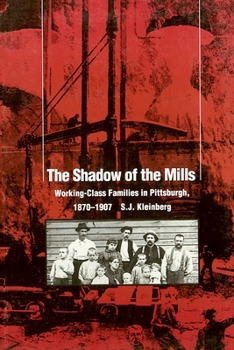The Shadow of the Mills: Working-Class Families in Pittsburgh, 1870-1907
Select Format
Select Condition 
Book Overview
The profound disruption of family relationships caused by industrialization found its most dramatic expression in the steel mills of Pittsburgh in the 1880s. The work day was twelve hours, and the work week was seven days - with every other Sunday for rest. In this major work, S. J. Kleinberg focuses on the private side of industrialization, on how the mills structured the everyday existence of the women, men, and children who lived in their shadows. What did industrialization and urbanization really mean to the people who lived through the these processes? What solutions did they find to the problems of low wages, poor housing, inadequate sanitation, and high mortality rates? Through imaginative use of census data, the records of municipal, charitable, and fraternal organizations, and the voices of workers themselves in local newspapers, Kleinberg builds a detailed picture of the working-class life cycle: marital relationships, the interaction between parents and children, the education and employment prospects of the young, and the lives if the elderly.
Format:Paperback
Language:English
ISBN:0822954451
ISBN13:9780822954453
Release Date:January 2010
Publisher:University of Pittsburgh Press
Length:440 Pages
Weight:1.30 lbs.
Dimensions:1.1" x 6.1" x 9.1"
Customer Reviews
1 rating
The best book about
Published by Thriftbooks.com User , 20 years ago
I disagree completely with the opinion of "nuclearmse." Kleinberg's book is the best picture of the working class of Pittsburgh in a period of tremendous industrial growth. Kleinberg's research is exemplary, and it is original research--census records, death notices, archives of churches and numerous social service organizations-- not a rehash of secondary sources. The narrative is sometimes too scholarly and packed with statistics, but her descriptions of the terrible hardships the mill workers and their families had to endure are very often deeply moving. This book should be read by everyone interested in the lives of the working class in America.





